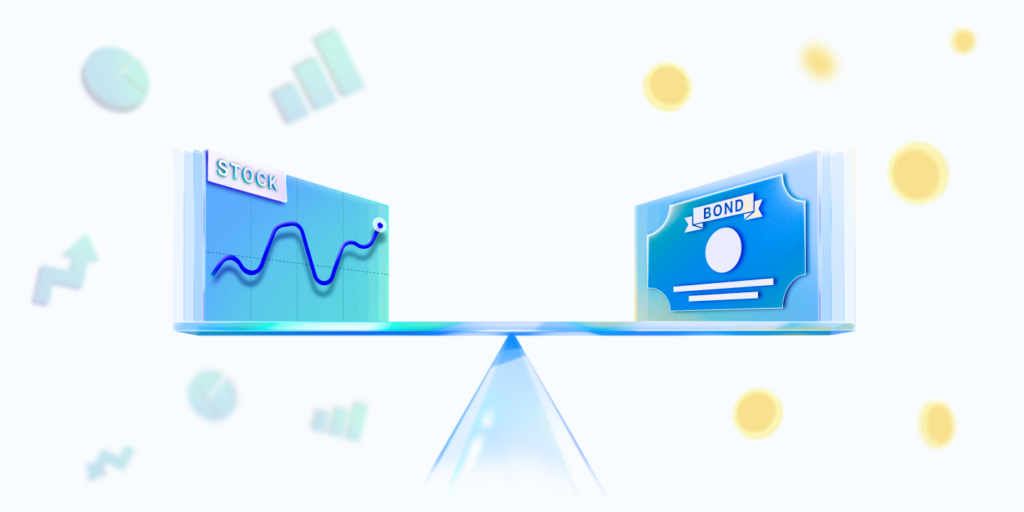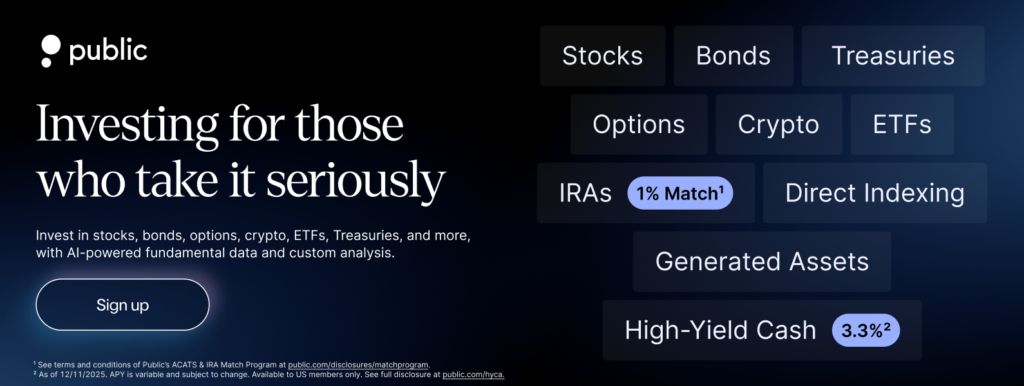When building an investment portfolio, you may come across the question: Should you invest in stocks or bonds? Both asset classes serve different purposes and come with their own risks and potential rewards. Understanding how they work can help you decide how they might fit into your overall investment approach.
In this detailed guide, we’ll break down the differences between stocks and bonds, their key characteristics, and how to align your choice with your financial goals.
What are stocks?
Stocks represent ownership in a company. When you buy a stock, you own a piece of that company, which may entitle you to dividends (if the company offers them) and voting rights at shareholder meetings.
If the company does well, the stock price may rise, and you could earn a profit. Conversely, if the company performs poorly, the stock price may drop, potentially resulting in a loss.
Stocks are typically bought and sold on stock exchanges like the New York Stock Exchange (NYSE) or Nasdaq.
Key characteristics of stocks:
- Growth potential: Stocks have historically provided long-term capital appreciation, but they also carry market volatility.
- Dividends: Some companies pay dividends, which can provide a source of income. However, dividends are not guaranteed.
- Market risk: Stock prices fluctuate due to company earnings, investor sentiment, and broader economic conditions.
For example, if you purchase 10 shares of an ABC company at $50 per share and the stock price rises to $60, your investment value increases from $500 to $600. However, if the company faces financial difficulties, the stock price may decline, reducing your investment’s value.
Related Read: What are stocks? How does the stock market work
What are bonds?
Bonds are debt securities issued by governments, municipalities, or corporations to raise capital. When you buy a bond, you are essentially lending money to the issuer in exchange for periodic interest payments and the return of the principal amount at maturity.
Key characteristics of bonds:
- Fixed income: Bonds generally provide predictable interest payments (also called coupon payments) at regular intervals.
- Lower volatility: Compared to stocks, bonds tend to be less volatile, but their value can still fluctuate based on interest rates and credit ratings.
- Credit risk: The risk of default depends on the issuer’s ability to repay the loan. Government bonds tend to have lower credit risk than corporate bonds.
Related Read: What are Bonds? Types, benefits, and how to invest in them
For example, if Company X, issues a 10-year corporate bond with a 5% annual coupon rate, and you invest $1,000, you would receive $50 per year in interest payments until the bond matures. Company X would return your original $1,000 principal at maturity, assuming they do not default. However, if the company’s financial condition deteriorates, there is a risk that it may not fully repay its bondholders.
Stocks vs. Bonds: Key differences
The table below outlines the fundamental differences between these two primary investment vehicles:
Factors to consider when choosing between stocks and bonds
When deciding between investing in stocks or bonds, several factors come into play. Your financial goals, risk tolerance, and market conditions may influence which asset class aligns with your investment approach. Below are key considerations to help you evaluate your choices.
1. Risk tolerance
Your ability to handle market fluctuations is a major factor in choosing between stocks and bonds.
- Stocks: Generally carry higher risk because their prices can fluctuate due to company performance, economic conditions, and market sentiment.
- Bonds: Often considered a safer investment because they provide fixed interest payments and return the principal at maturity.
2. Investment horizon
Your time frame for investing—how long you plan to hold your investments—can impact your decision.
- Short-term investors (1-5 years): Bonds may be preferable if you need predictable returns within a few years.
- Long-term investors (5+ years): Stocks may provide higher potential returns over time despite short-term market volatility.
3. Market conditions and economic outlook
- Stock market conditions: Stocks may perform well in a growing economy but can decline during recessions.
- Interest rates and bonds: Bond prices move inversely to interest rates. When interest rates rise, existing bond prices may tend to decline.
4. Diversification and portfolio balance
A mix of stocks and bonds may help balance risk and return.
- All-stock portfolio: This may offer higher returns but has more volatility.
- All-bond portfolio: This may provide stability and income but may have lower long-term growth potential.
- Mixed portfolio: A blend of stocks and bonds may reduce risk while capturing growth opportunities.
How to invest in stocks & bonds on Public.com
1. Sign up for a brokerage account on Public
You can sign up for an account on our website or download the Public app from the App Store (iOS) or Google Play Store (Android).
2. Add funds to your Public account
Once your account is set up and verified, you’ll need to deposit funds. You can add funds to your public account using ACH or debit card.
3. Choose how much you’d like to invest
Navigate to the Explore page or use the search bar to find your stock or bond.
4. Manage your investments in one place
You can find your newly purchased stock/bond in your portfolio—alongside the rest of your stocks, ETFs, crypto, bonds, and options.
Conclusion
Stocks and bonds serve different roles in an investment portfolio. Stocks may offer growth potential but come with higher risk, while bonds provide income and stability. The right mix depends on your financial goals, risk tolerance, and investment timeline. A well-balanced approach may involve a mix of both asset classes to align with your objectives.
If you’re considering investing in stocks, bonds, or both, signing up on Public.com makes it easy to start. Public offers an all-in-one brokerage platform to simplify your investing journey where you can build a multi-asset portfolio, including stocks, bonds, crypto, options, and IRA.


